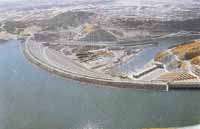Sunni militants advance toward large Iraqi dam
 |
| The Haditha Dam in 2006, when it was protected by American Marines. Jim Wilson/The New York Times |
BAGHDAD — Iraqi security officials said Wednesday that fighters with the Islamic State in Iraq and Syria were advancing on the Haditha Dam, the second-largest in Iraq, raising the possibility of catastrophic damage and flooding.
This would not be the first time that dams have figured in the conflict. In April, when ISIS fighters seized the Falluja Dam, they opened it, flooding crops all the way south to the city of Najaf. The water at one point washed east as well, almost reaching Abu Ghraib, close to Baghdad.
READ MORE HERE...
The threat of "catastrophic damage and flooding" figures greatly in Jeremiah's prophecy of doom on the land of Babylon, representing the eighth judgment, the most destructive of all nine: "The sea (or broad river) has come up over Babylon; she has been engulfed with its tumultuous waves," Jer 51:42.
Following the catastrophic flood, "(God) shall dry up her sea (or broad river) and make her fountain dry, and Babylon will become a heap of ruins, a haunt of jackals, an object of horror and hissing, without inhabitants," Jer 51:36-37.
The drought seems to be a consequence of the flood, and the flood and drought result in Babylon's "perpetual desolation," Jer 51:62.
"Thou, O LORD, hast promised concerning this place to cut it off, so that there will be nothing dwelling in it, whether man or beast, but it will be a perpetual desolation."
Labels: Final Outcome - Complete Desolation, Judgment 8 - Flood, Judgment 9 - Drought





